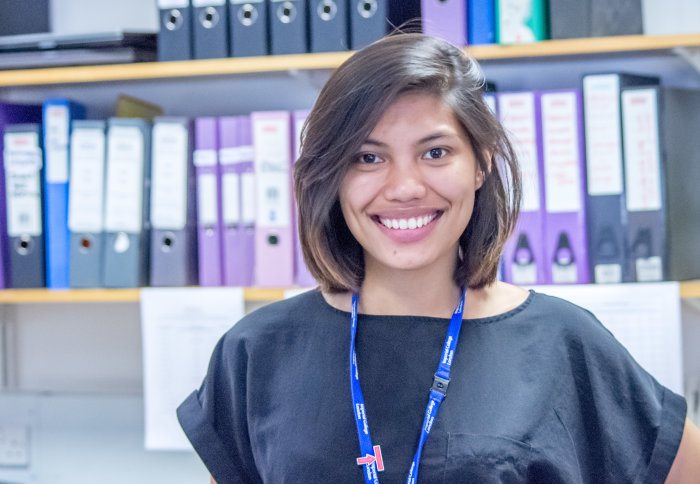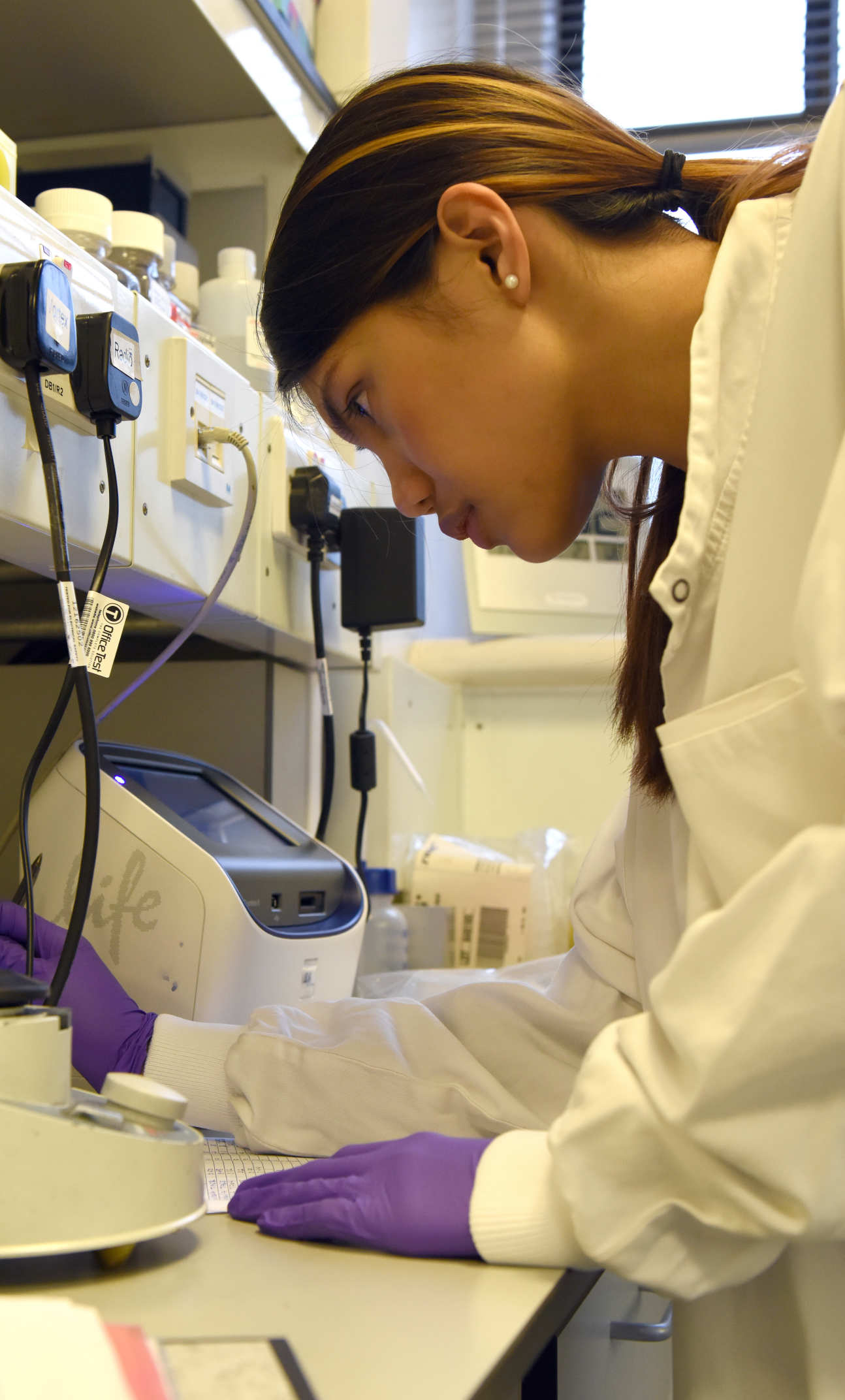“In such a large organisation, it’s great when your hard work is acknowledged”

With nominations now open for the 2019 President’s Awards for Excellence, previous winner Mica Tolosa-Wright looks back on her win earlier this year.
Research Technician Mica, of the National Heart and Lung Institute, won the 2018 President’s Award for Research Support Excellence for her work at the Tuberculosis (TB) Research Centre.
Mica was nominated for a number of achievements, including being the primary laboratory supervisor for a Master of Research (MRes) student, and training in containment level 3 laboratory protocols in order to independently deal with highly-infectious TB samples.
"Mica's untiring enthusiasm for hypothesis-driven research and innovative laboratory practices has been an inspiration for the entire team." Dr Alice Halliday Former line manager and mentor
Mica was also singled out for managing a research sub-study on validating and optimising a candidate PCR-based molecular rule-out test for active TB – a platform which looks at the gene expression of clinical samples. This study, which is supported by the National Institute for Health Research (NIHR) Imperial Biomedical Research Centre and the NIHR Health Protection Research Unit in Respiratory Infections, is taking a different approach to improve the current immunological test available for active TB.
Mica is now working on a new research MRC funded study, investigating the immunological response for implementation of Live Attenuated Influenza Vaccination (LAIV), and has started a part-time Master’s in Genomic Medicine at Imperial. We spoke to Mica about her reflections on winning the President’s Award for Excellence.
Curiosity-driven science

“I’m very curious and have always been intrigued by biology and chemistry,” explains Mica. “I was always fascinated by how microbes can infect humans and create havoc in the system, or the techniques available to extract DNA from a drop of blood,” Mica explains. “It encouraged me to pursue an undergraduate degree in Forensic Science at Staffordshire University.”
At Imperial, Mica has supported the different arms of project VANTDET, or Validation of New Technologies for Diagnostic Evaluation of Tuberculosis, which was funded by the NIHR and used data from patients with suspected active TB. By using state-of-the-art transcriptomic, proteomic, flow cytometry and molecular techniques, the project made a persuasive case for the importance of new diagnostic tests for TB in routine NHS practice – blood tests that can rapidly rule-in and rule-out a diagnosis of TB.
Mica says: “I really liked the diverse techniques I was able to learn throughout the project - it really put my skills to the test and challenged me on a higher level. It was also an exciting research project to be involved in as we used a real-life cohort of patients at a stage where we suspect they have TB, which is very unique and different to other research studies.
“I’ve also had the opportunity to meet leaders in the field of TB and influenza and see the impact of their research on the world outside the lab. I recently got involved in public engagement activities as well having conveyed our research to the local community through an animated film about TB.”
Taking inspiration from colleagues
Mica says there is “never a dull moment” at work and feels that she is making a real difference to the world. “Some days I’m at my desk looking at human genome sequences, and the next day I’m in high level bio-safety labs working with infectious human samples.” 
Mica also feels her colleagues at Imperial have helped her to grow: “I am fortunate to be surrounded by incredible team members in the TB research centre. My team is made up of women who are early career researchers, and they have shown me that having a multidisciplinary group is really valuable as you are exposed to different perspectives and are encouraged to broaden your horizons.
“Throughout my time at Imperial, Dr Alice Halliday, my mentor and former line manager, has really inspired me. She is one of the most brilliant scientists I have met, but at the same time is a wonderful and kind person who always leads by example. Dr Halliday is one of my main inspirations for pursuing an academic career, and for bettering myself as a human being. I am hopeful that the progression of women like Alice to supervisory and lead investigator roles will positively transform the future of science.”
Surpassing expectations
In her nomination for Mica, Dr Halliday wrote: “Mica is a great source of support to the team in times of personal and professional strife – her supportive approach and enthusiasm for inclusiveness extends beyond the group, as she has played a pivotal role in our public and patient engagement activities to engage marginalised and at-risk communities.
“In all of her work roles, Mica's performance far surpasses expectations; her untiring enthusiasm for hypothesis-driven research and innovative laboratory practices has been an inspiration for the entire team, including senior members, and we believe her friendliness, reliability and team-oriented outlook are essential to the inclusive and mutually supportive work atmosphere that we enjoy in our group.”
Championing women in STEM
"It would be great to see more women in leadership roles, and the next positive step would be to see more diversity among these high-ranking women.” Mica Tolosa-Wright Research Technician
Mica has also taken part in Imperial’s programme of schools outreach work to share her career path and inspire young women to pursue STEM careers.
“There are now a great number of women studying and working in STEM subjects, but when you look at senior leaders there are still fewer women in positions of authority,” Mica says. “It is great to see Imperial’s own President Alice Gast, or women like Cressida Dick, Commissioner of the Metropolitan Police Service, and Professor Dame Sally Davies, Chief Medical Officer for England, paving the way for the younger generation to aspire to have greater roles. It would be great to see more women in leadership roles, and the next positive step would be to see more diversity among these high-ranking women.”
On winning the President’s Award earlier this year, Mica commented: “It was great to be nominated by my co-workers and be recognised by the College. I think the President’s Awards are important because I know we are all exceptionally busy in our day jobs. In such a large organisation, it is great when someone acknowledges your hard work – especially the President of Imperial.”
As she dives deeper into her new research project, Mica said: “Our new research on LAIV aims to use our globally unique Biobanked samples to answer some unmet clinical needs regarding influenza vaccine. The results of this exciting study could have potential impacts on public health policies in the UK and beyond.”
Article text (excluding photos or graphics) © Imperial College London.
Photos and graphics subject to third party copyright used with permission or © Imperial College London.
Reporter
Martha Salhotra
Communications Division